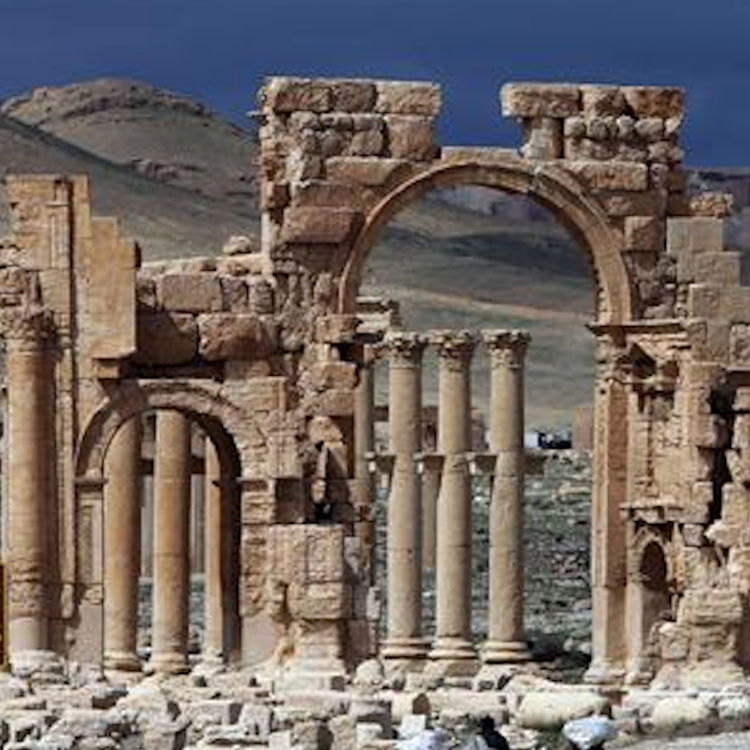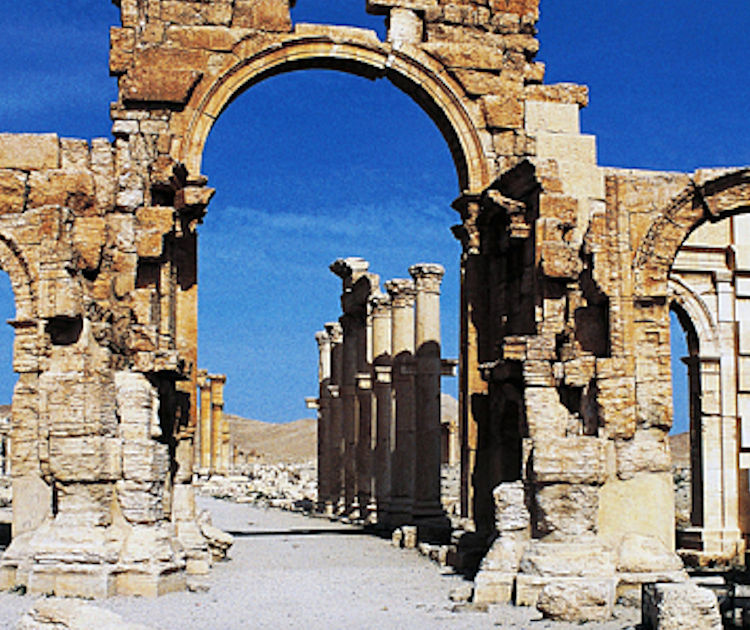AncientPages.com - Islamic State of Iraq and the Levant (ISIL) extremists have blown up the famous Arch of Triumph in the ancient Syrian city of Palmyra, the country's head of antiquities said Oct.5, as the jihadists press their campaign to tear down the treasured heritage site.
The militants have carried out a sustained campaign of destruction against heritage sites in areas under their control in Syria and Iraq, and in mid-August beheaded Palmyra's 82-year-old former antiquities chief, reports Hurriyet Daily News.
Syrian antiquities director Maamun Abdulkarim warned of impending catastrophe in the UNESCO-listed world heritage site, which the jihadists have been dismantling since capturing the ruins in May.

A file picture taken on March 14, 2014 shows visitors walking near the famous Arch of Triumph of the ancient oasis city of Palmyra, 215 kilometres northeast of the Syrian capital Damascus. AFP Photo
"This is a systematic destruction of the city. They want to raze it completely," Abdulkarim told AFP.
"They want to destroy the amphitheatre, the colonnade. We now fear for the entire city," he added, calling on the international community to "find a way to save Palmyra".
Known as the "Pearl of the Desert", the ancient oasis town of Palmyra situated about 210 kilometres (130 miles) northeast of Damascus became famous as a stopping point for caravans travelling on the Silk Road.
Both the citadel and the ruins are on the UNESCO World Heritage list, and before the war around 150,000 tourists a year visited Palmyra.
Sunni extremist group ISIL has already destroyed the shrine of Baal Shamin and the 2,000-year-old Temple of Bel, regarded as Palmyra's masterpiece, as part of a campaign to destroy pre-Islamic monuments, tombs and statues it considers idolatrous.

“They want to destroy the amphitheatre, the colonnade. We now fear for the entire city,” he added, calling on the international community to “find a way to save Palmyra”.
Experts say the militants have used the destruction to raise their profile to attract new recruits, and are also funding their "caliphate" by selling artifacts on the black market.
Syria's archaeology association, the APSA, says that more than 900 monuments and archeological sites have been looted, damaged or destroyed during the four-year civil war.
The Arch of Triumph, situated at the entrance of the ancient ruins' historic colonnaded street, was an "icon of Palmyra," Abdulkarim said, warning that IS fighters have already laid explosives in other monuments.
"We have received news from the site that the Arch of Triumph was destroyed yesterday (Sunday). IS [ISIL] booby-trapped it several weeks ago," he told AFP.
"We are living through a catastrophe. Since the capture of the city (by ISIL), it has been one shock after another."
The Syrian Observatory for Human Rights monitoring group and local activist Mohammad Hassan al-Homsi backed up the account, saying the arch had been ruined.
"The Arch of Triumph was pulverised. IS has destroyed it," said Homsi.
Palmyra's ancient citadel has also been damaged by heavy bombardment from barrel bombs dropped by Syrian government forces, according to experts and activists.
ISIL has taken advantage of the chaos in Syria caused by its four-year long civil war, which has killed more than 240,000 people and sent millions fleeing, to expand its influence in the country.
A year-long US-led air campaign has been unable to stop the militants, and Russia five days ago started its own strikes against what it said are targets belonging to ISIL and other jihadist groups.
Western powers have accused Russia of instead targeting moderate opponents of Syrian President Bashar al-Assad, an important ally of Moscow.
"This is a systematic destruction of the city. They want to raze it completely," Abdulkarim told AFP.
"They want to destroy the amphitheatre, the colonnade. We now fear for the entire city," he added, calling on the international community to "find a way to save Palmyra".
Known as the "Pearl of the Desert", the ancient oasis town of Palmyra situated about 210 kilometres (130 miles) northeast of Damascus became famous as a stopping point for caravans travelling on the Silk Road.
Both the citadel and the ruins are on the UNESCO World Heritage list, and before the war around 150,000 tourists a year visited Palmyra.
Sunni extremist group ISIL has already destroyed the shrine of Baal Shamin and the 2,000-year-old Temple of Bel, regarded as Palmyra's masterpiece, as part of a campaign to destroy pre-Islamic monuments, tombs and statues it considers idolatrous.
Experts say the militants have used the destruction to raise their profile to attract new recruits, and are also funding their "caliphate" by selling artifacts on the black market.
Syria's archaeology association, the APSA, says that more than 900 monuments and archeological sites have been looted, damaged or destroyed during the four-year civil war.
The Arch of Triumph, situated at the entrance of the ancient ruins' historic colonnaded street, was an "icon of Palmyra," Abdulkarim said, warning that IS fighters have already laid explosives in other monuments.
"We have received news from the site that the Arch of Triumph was destroyed yesterday (Sunday). IS [ISIL] booby-trapped it several weeks ago," he told AFP.
"We are living through a catastrophe. Since the capture of the city (by ISIL), it has been one shock after another."
The Syrian Observatory for Human Rights monitoring group and local activist Mohammad Hassan al-Homsi backed up the account, saying the arch had been ruined.
"The Arch of Triumph was pulverised. IS has destroyed it," said Homsi.
Palmyra's ancient citadel has also been damaged by heavy bombardment from barrel bombs dropped by Syrian government forces, according to experts and activists.
ISIL has taken advantage of the chaos in Syria caused by its four-year long civil war, which has killed more than 240,000 people and sent millions fleeing, to expand its influence in the country.
A year-long US-led air campaign has been unable to stop the militants, and Russia five days ago started its own strikes against what it said are targets belonging to ISIL and other jihadist groups.
Western powers have accused Russia of instead targeting moderate opponents of Syrian President Bashar al-Assad, an important ally of Moscow.
AncientPages.com
source: Hurriyet Daily News





